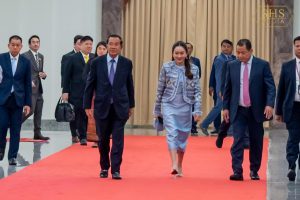Paetongtarn Shinawatra, the leader of Thailand’s ruling Pheu Thai Party, yesterday paid a one-day visit to Cambodia aimed at strengthening its relationship with its counterpart in Phnom Penh – a sign of a growing momentum in the two nations’ bilateral relations.
During the visit, she held meetings with senior officials including Prime Minister Hun Manet and his father, Hun Sen, the president of the ruling Cambodian People’s Party (CPP). In a post on social media, the Pheu Thai Party described the visit as a party-to-party diplomacy with the Cambodian People’s Party.
“This visit to Cambodia was a meeting at the political party level, which aimed to strengthen the relationship between the Pheu Thai Party and the CPP,” the party said, according to the Phnom Penh Post. It added that the party is “fully committed to working with the party of Hun Sen and the government of Hun Manet to strengthen Thailand-Cambodia relations even further.”
Neither side offered substantial details about what was discussed, though the Pheu Thai statement did mention that the two sides pledged themselves to joint efforts to boost tourism, and cooperation to resolve the region’s horrific air pollution problem.
In a statement of its own, Cambodia’s National Assembly, whose acting president Cheam Yeap also met with Paetongtarn, said that the Pheu Thai chairman “mentioned the long relations between the CPP and the Pheu Thai Party, noting that it must be nurtured into the future.”
While Paetongtarn’s visit ostensibly focused on party-to-party ties, it was also a decidedly family affair, in which the daughter of former Thai Prime Minister Thaksin Shinawatra met with the father and son who have governed Cambodia for the best part of four decades. It came after Hun Sen paid a personal visit to call on Thaksin in Bangkok last month and a state visit by Hun Manet to Thailand shortly prior.
In this sense, it reflects the renewed energy in bilateral relations since last September, when Pheu Thai returned to office for the first time since the military coup of 2014. Prime Minister Srettha Thavisin’s government took office three months after a general election in which Pheu Thai was eclipsed by the more progressive Move Forward Party (MFP).
After the military-appointed Senate blocked the MFP from forming a government with Pheu Thai, the latter joined hands with its former foes in the conservative establishment and formed a new government, seemingly burying the hatchet after a political conflict dating back to Thaksin’s election in 2001. This political realignment also allowed Thaksin’s return from self-exile rapid rehabilitation, and his liberation from the eight-year prison sentence on corruption-related charges that had kept him in self-exile since 2008.
While relations between Phnom Penh and Bangkok warmed under Prime Minister Prayut Chan-o-cha, the return of Thaksin and his clan to power and influence has delivered a further fillip to the bilateral relationship. Hun Sen welcomed Thaksin to Cambodia on a number of occasions during his 15 years of self-exile and in 2009, named Thaksin a special economic advisor, riling up Thai nationalist opinion.
With the two families back in office for the first time in a decade, time is therefore propitious for progress on a number of fronts. When Manet and Srettha met in Bangkok last month, they pledged, among a host of minor issues, to push forward with efforts to resolve their overlapping claims in the Gulf of Thailand, where there are believed to be considerable natural gas deposits.
“We hope that the talks will yield results very soon in the near future so that both countries can mutually benefit from this,” Manet said after the meeting. The two nations also announced plans to open Thai and Cambodian consulates in Siem Reap and Songkhla, respectively, among a host of other economic issues.
The loser, as always, is human rights, and the Cambodian and Thai dissidents who have historically sought sanctuary in the other country. Prior to Manet’s state visit in early February, Thai police arrested three Cambodian exile dissidents who had planned protests during the visit.
During his meeting with Srettha last month, Manet thanked him for rounding up the government critics, all of whom had fled the CPP persecution over the past few years. In turn, Srettha reassured him “regarding Thailand’s policy of not allowing anyone to use Thailand as a platform to interfere in the internal affairs of [their country] to conduct harmful activities against the neighboring country.”

































